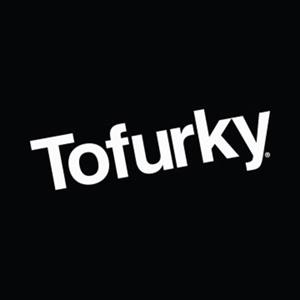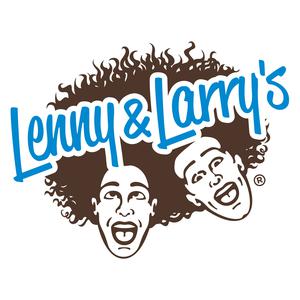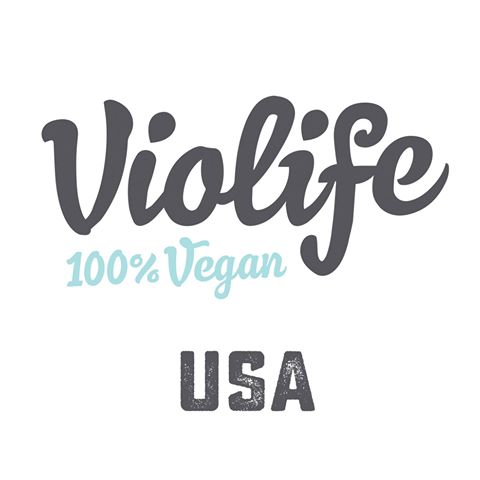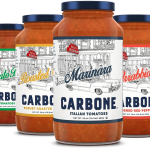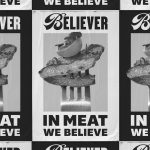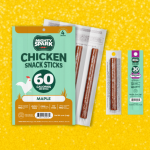The Checkout: Eat Your Coffee Sells To Private Equity Firm; Louisiana Court Sides With Tofurky
Welcome to The Checkout: an express lane for the weekly news you need to know, always 10 items or less.

Eat Your Coffee Sells To Private Equity Firm, Aims to Expand DTC Efforts
Johnny Fayad and Ali Kothari, the co-founders of energy snack bar brand Eat Your Coffee, have announced earlier this month they have sold the business to StartupsNext, a Chicago-based private equity firm. Fayad said the group currently operates a portfolio of websites and is looking to expand into physical goods to leverage the traffic and advertising potential of their existing businesses.
“We are excited about the synergies we have with their portfolio of websites to continue expanding Eat Your Coffee as a direct to consumer company,” said Fayad. “Since our shift down this path in early 2020, we’ve loved having the closer relationship with our customers and look forward to reaching more with their network.”
The pair started the company six years ago, out of their college dorm at Northeastern University and will stay on as advisors. Fayad said the company’s acquirer will take over day-to-day operations but himself and Kothari will still be involved in “major decisions and direction of the brand.”
“We’re looking forward to having some distance from the core work that needs to get done to be able to take a more strategic lens in helping Eat Your Coffee continue to expand into a household name,” he explained.
In 2019, Eat Your Coffee pivoted away from retail and towards foodservice, offices and e-commerce. This move paid off when the pandemic hit a year later: while initially the brand lost 80% of its business as offices went into lockdown, Fayad said it was able to recover a majority by quickly shifting focus to e-commerce.
“Within a few months, we were getting close to our pre-pandemic levels, but were in need of some capital to continue scaling at that pace,” said Fayad. “After a few conversations, we felt the timing was better suited for a sale. We had gotten so much out of the business to that date and decided we were ready to pass the brand on to a new owner to continue scaling it in this new direction.”
Post-sale, Fayad and Kothari are both moving to Sensory Cloud company FEND and say the lessons they have learned while building Eat Your Coffee have taught them to move quickly, take educated bets, maintain a student mindset and “see the value in both [sides].”
“You’re never going to have perfect information and getting caught in the cycle of carefully considering every decision is a big trap a lot of early founders find themselves in,” said Fayad. “Looking ahead, we’re grateful of what this experience has afforded us in the knowledge of having scaled a brand, learned from a ton of mistakes, and can now move more quickly, understanding the path more clearly to scale and not getting caught in the minutiae.”
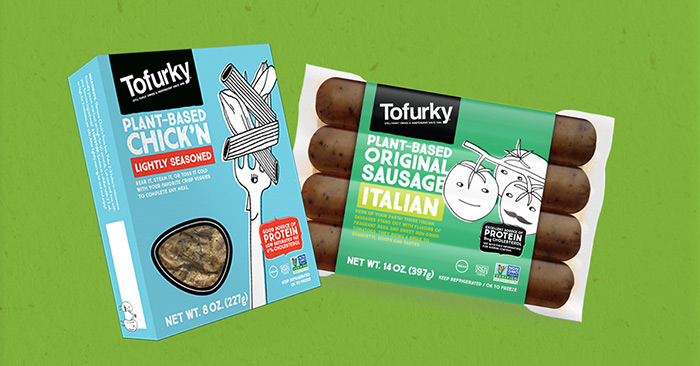
Louisiana Court Sides With Tofurky in Labeling Censorship Law
The U.S. District Court for the Middle District of Louisiana has deemed one of the state’s new food labeling laws unconstitutional, citing that it violates the first amendment rights of plant-based protein makers. The suit, which was filed in October 2020 by Tofurky, the Animal Legal Defense Fund, and The Good Food Institute, challenged the law for “improperly censoring truthful commercial speech.” Representative Francis Thompson, the law’s sponsor, has admitted he designed the law to protect Louisiana’s agricultural producers from growing competition from alternative meat options.
The bill, which prohibited the use of language like “burger” and “hot dog” in the context of plant-based products, was passed at a time when similar laws had been introduced in Arkansas, Missouri and Mississippi, among other states. Arkansas has since declared its legislation unconstitutional, while the remaining states are also facing similar legal challenges from Tofurky, the Animal Legal Defense Fund and The Good Food Institute.
“Louisiana’s labeling law was a clear and unconstitutional attempt to protect the animal agriculture industry from competition amidst the growing market for foods not derived from slaughtered or confined animals, which don’t carry the same risks to human health, animals, and the environment,” said Stephen Wells, Animal Legal Defense Fund Executive Director, in a press release. “Under the First Amendment, companies are entitled to market and label their products in truthful ways that consumers will recognize and that aligns with their values.”
Tofurky’s president and CEO Jaime Athos called the ruling “a victory for the entire plant-based industry,” in the release. “The Louisiana court has seen right through the disingenuous pretext under which this law was passed, and rightfully intervened to protect the first amendment rights of companies like Tofurky and the rights of Louisianans to have unfettered access to the healthier, more sustainable foods of their choosing.”
“The law was an obvious attempt to give unfair advantage to animal agriculture interests by stifling the growth of plant-based food sales, and this ruling serves as a warning to other state legislatures who may forget that they are elected to serve the needs of their constituents, not those of corporate special interests. Consumers are not confused.”

Lenny & Larry’s Teams Up With The San Diego Zoo
Better-for-you snack maker Lenny & Larry’s announced it has partnered with the San Diego Zoo to celebrate the opening of its Wildlife Explorers Basecamp and promote its new on-the-go ‘The Complete Cookie-Fied Bar’ product. The new zoo installation features three acres of “wildlife adventures,” and encourages participants to “develop empathy for wildlife” while sharing the snack maker’s mission of “living an active and healthy lifestyle.”
“We are thrilled to partner with the San Diego Zoo in celebration of their new Wildlife Explorers Basecamp to promote our shared values of helping foster curiosity and a love of animals, while nourishing minds and bodies with clean ingredients,” said Lenny & Larry’s CEO, Jolie Weber, in a press release. “Through this partnership, we hope to bring additional awareness to the launch of our recently released The Complete Cookie-Fied Bar, which was formulated to provide healthy snacking on the go, or in this case, at the Zoo.”
The new bar is available in Chocolate Almond Sea Salt, Peanut Butter Chocolate Chip and Cookies & Creme flavors, each containing 12 grams of protein and 5 gram of prebiotic fiber. Alongside this partnership, Lenny & Larry’s has activated its Complete Cookie-fied Bar online Sweepstakes, the winner of which will receive a trip to the San Diego Zoo with a VIP tour.
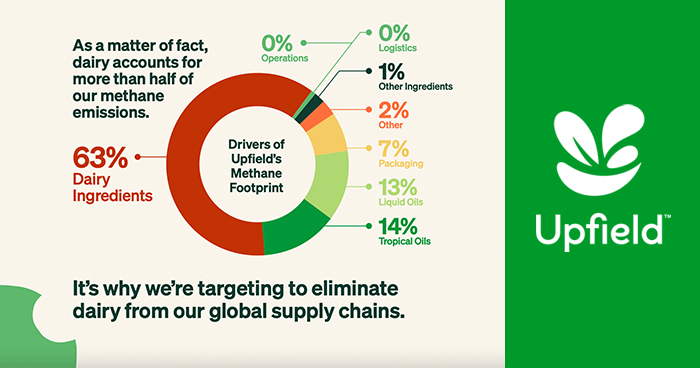
Upfield Voluntarily Discloses Corporate Methane Footprint
Upfield, the parent company of plant-based dairy brands like Violife and Flora, announced that 7.5% of its 3.15 million tonnes of greenhouse gas emissions come from methane. The announcement was made to urge other food companies to be open and transparent while also working to reduce their methane footprint.
The company said these emissions account for more air pollution than its scope one and two carbon emissions – which have recently been the primary focal point for food and beverage companies looking to reduce their climate impact. Upfield said its methane disclosure is a call to action for policymakers and businesses to promote widespread methane disclosure following COP26, where these disclosures were a focus in other industries but went “largely unaddressed” in relation to food and agriculture.
“Important discussions started on the urgency with which we need to address methane as a contributor to the climate crisis at COP26 around fossil fuels, while methane in the food and agriculture sector was hardly mentioned,” said Sally Smith, Upfield’s Global Director Sustainability & ESG, in a press release. “We are disclosing our methane footprint to set a precedent for methane transparency in the food sector. We want to help establish a methodology for measuring and disclosing methane, and to encourage action to rapidly reduce this harmful greenhouse gas. If you think there is a better way to disclose methane, we would like to hear it.”


